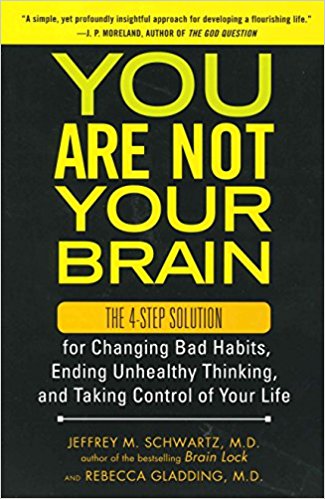You Are Not Your Brain Summary
6 min read ⌚
 The 4-Step Solution for Changing Bad Habits, Ending Unhealthy Thinking, and Taking Control of Your Life
The 4-Step Solution for Changing Bad Habits, Ending Unhealthy Thinking, and Taking Control of Your Life
What if you could think of your thoughts as movie projections happening inside your head? And what if there’s a possibility that these thoughts are not actually yours?
Moreover, what if there’s a way you can break off the stream of bad thoughts willingly, or, in a manner of speaking, to change the reel before the cue mark? Are you prepared to hear how to put on a feel-good comedy every time your brain shows you a horror?
Yes?
Now, that’s our cue!
Who Should Read “You Are Not Your Brain”? And Why?
Bad habits are nothing short but the bane of your existence. Now, do you consider the previous sentence an accurate description of your life’s problems?
If so, “You Are Not Your Brain” is a book you should definitely read. In fact, it should provide most readers with a wealth of practical and easily applicable instructions and exercises on how to get rid of the habits they hate. And, as its subtitle says, reclaim back their lives.
About Jeffrey M. Schwartz and Rebecca Gladding
 Jeffrey M. Schwartz, M.D., is one of the pioneers in the field of self-directed neuroplasticity. A Research Psychiatrist at UCLA School of Medicine, he is the author of many scientific articles, as well as few very successful self-help books. “The Mind and the Brain” is a precursor to “You Are Not Your Brain”, and “Brain Lock” is targeted at people who suffer from OCD.
Jeffrey M. Schwartz, M.D., is one of the pioneers in the field of self-directed neuroplasticity. A Research Psychiatrist at UCLA School of Medicine, he is the author of many scientific articles, as well as few very successful self-help books. “The Mind and the Brain” is a precursor to “You Are Not Your Brain”, and “Brain Lock” is targeted at people who suffer from OCD.
 Rebecca Gladding, M.D., is an Attending Psychiatrist at UCLA, whose focus lies with anxiety, depression, and neuroplasticity. Since 1999, she has worked closely with Jeffrey Schwartz. This is her only book so far.
Rebecca Gladding, M.D., is an Attending Psychiatrist at UCLA, whose focus lies with anxiety, depression, and neuroplasticity. Since 1999, she has worked closely with Jeffrey Schwartz. This is her only book so far.
“You Are Not Your Brain Summary”
The message of “You Are Not Your Brain” is exactly the one that stands there in the title:
You can control your brain much more easily than you believe. Humans are capable of not only adapting perfectly, but also of even being counter-evolutive. You just need to harness that power and start modifying the way your brain works.
Because, you see, bad habits are nothing more than badly anchored experiences.
For example, smoking every time you feel stressed leads to a vicious cycle which associates stress and smoking. After a while, you’ll forget whether you smoke because of your stress or whether the craving for a cigarette has made you feel stressful.
It’s very bad, because you’re stuck in the loop of deceptive brain messages!
The good news:
You are not your brain! And the even better news: you can control your brain with your mind. Only the first of these two is biologically defined; the second is what makes you who you are, a unique being. And with the help of your mind, you can reprogram your brain against biology!
It’s called self-directed neuroplasticity and it’s a four-step process aimed at rewiring your synapses. And there’s an easy way to remember the steps, since all begin with “R”: relabel, reframe, refocus, revalue.
Let’s go through them one by one!
Relabel is the foundation of the Four Steps neuroplasticity program. It’s a two-part practice, intended to help you identify and relabel the deceptive brain messages.
How?
By meditating yourself into a deep state of mindfulness. This way, you appropriate your thoughts. Consequently, you can acknowledge each wandering or drifting as a thought which is not actually yours. After the exercise – name it. You’ll feel better already.
But, that’s only the first step!
The second is all about seeing your bad thoughts for what they actually are. Unfortunately, knowing that your stress is a false brain message and labeling it as such won’t stop you from smoking. That’s why you need to reframe this unreliable thought.
Will yourself into a state where you can consciously believe that your brain is lying to you! And you can do this by being aware that your brain is constantly making some false assumptions.
“Catastrophizing” and “all-or-nothing” thinking are two examples of them.
You’re “catastrophizing” when you blow your current experiences out of your proportions believing that they spell the end of your life. “
All-or-nothing” thoughts are closely related: if you have them, you think that a situation can be either “the best in the world” or “a disaster”. And consequently, you’ll either feel ecstatic or depressed.
After naming and dismissing your bad thoughts as brain program errors, it’s time to refocus and create new circuits. Now, that you know that smoking is not a good answer to feeling stressed, go and find the right one. Start walking or biking mindfully, call a friend to talk to him or her for as long as you forget your craving.
Do this quite a few times and you’ll see that your brain will fall under the spell of this new life mantra: “stress is countered by walking and talking… stress is…”
Time to put the bow on the show:
Revalue. Start experiencing your life as if an outsider. See what you would advise a friend if he was in your shoes. Is smoking such a great stress-reliever if you advise someone what to do when feeling stressed?
Of course it’s not.
Key Lessons from “You Are Not Your Brain”
1. Your Brain Is Lying to You
2. Take Control of Your Thoughts in Four Simple Steps
3. Keep a “Healthy Habits” Notebook
Your Brain Is Lying to You
It’s almost intuitive to think that you are what you’re thinking at this moment. But, as Descartes famously doubted, what if a demon is controlling your thoughts? How can you be sure that it is not?
His thought experiment is well-worth a try even four centuries later. What if you’re not the person who just screamed at his parents or her employees? What if it is merely a way your brain is programed to work despite your wishes?
News flash: that’s exactly how it is! Your brain is the physical part of your personality. It’s merely the hardware. Your mind – the sum of your mental processes – is the software.
And it can be “a smoking app” or a “walking app”. It’s your choice which one of these you’ll install. Your brain will follow suit either way.
Take Control of Your Thoughts in Four Simple Steps
Now that you know that your brain serves your mind and not vice-versa, it’s time to reprogram it in four steps.
First of all, relabel. Meaning: identify your problems. E.g.: “Every time I’m stuck at something, I take the shortcut to stress-relief by smoking a cigar.”
Then, reframe. Put this thought in the right folder. E.g.: “Smoking doesn’t help me get my work done faster. It actually does the opposite. It’s a bad brain circuit.”
Thirdly, refocus. I.e. create a new circuit. Maybe, play some of your favorite songs or take a short walk outside?
Finally, revalue. Acknowledge the better you by looking at the situation from outside. Say: “smoking was a deceptive brain message. I now tackle stress much better. I’m walking it off.”
Keep a “Healthy Habits” Notebook
Now, moving from phase 2 to phase 3 is not as easy as it sounds. After all, in time, even a good and calming habit may seem tiring. So, the solution is to make a list of all the good habits you can think of, so that you can juggle with them. That way, you’ll still get the instant gratification! But, this time it will be through an activity, which you know is good for you!
Like this summary? We’d Like to invite you to download our free 12 min app, for more amazing summaries and audiobooks.
“You Are Not Your Brain” Quotes
Habit, if not resisted, soon becomes necessity. (via Saint Augustine) Share on X Deceptive brain messages have intruded into your psyche and taken over your life. Share on X The encouraging message… is that you do have control over your responses to these deceptive brain messages and you can use your understanding of how the brain works to your advantage by using our Four Step approach. Share on X While your situation may not be as dramatic or intense, some form of deceptive brain messages impacts almost everyone at some point in life. Share on X To truly change your life and your brain, you must reevaluate the deceptive brain messages and engage your mind to focus your attention on new, healthy actions and behaviors. Share on XOur Critical Review
“You Are Not Your Brain” is a book for all those people who desperately need to rewire their brains. And, of course, about those among them who are willing to spend some time not just reading this book, but also trying its advices.
Many of them will probably feel satisfied in the end: the instructions are mostly science-based and the effects should come soon enough. We think there’s something in here for everyone – though not everything for anyone.
Emir is the Head of Marketing at 12min. In his spare time, he loves to meditate and play soccer.


 The 4-Step Solution for Changing Bad Habits, Ending Unhealthy Thinking, and Taking Control of Your Life
The 4-Step Solution for Changing Bad Habits, Ending Unhealthy Thinking, and Taking Control of Your Life




